The WWF is run at a local level by the following offices...
- WWF Global
- Adria
- Argentina
- Armenia
- AsiaPacific
- Australia
- Austria
- Azerbaijan
- Belgium
- Bhutan
- Bolivia
- Borneo
- Brazil
- Bulgaria
- Cambodia
- Cameroon
- Canada
- Caucasus
- Central African Republic
- Central America
- Chile
- China
- Colombia
- Croatia
- Democratic Republic of the Congo
- Denmark
- Ecuador
- European Policy Office
- Finland
Community Supported Agriculture: "SpeiseGut" Bridging the Gap between Urban Consumers and Sustainable Agriculture
09 November 2023
"Gatower Gemüsegarten" is one of the areas where the CSA SpeiseGut cultivates produce. It’s where urbanites, farmers, and nature converge to create a sustainable food production system, fostering a community that is deeply rooted in organic and sustainable farming practices.
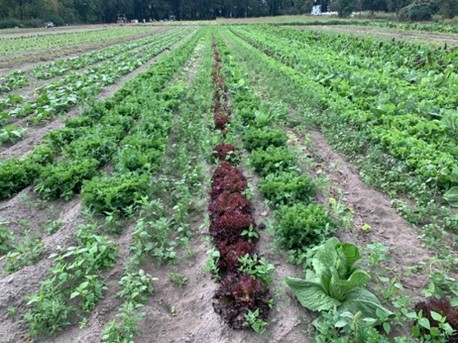
A Model of Shared Risks and Rewards
Gatower Gemüsegarten, operates on a CSA model where urban customers pay an annual fee, ranging from 60-120 EUR per month, and in return, receive weekly deliveries of organic produce between spring and autumn, and biweekly during the winter months January and Feburary. This model transcends mere transactional interactions, establishing a system of shared risks and rewards. Consumers, while enjoying fresh produce, also share agricultural risks, thereby developing a profound understanding and appreciation of the challenges faced by farmers. This model ensures consistent market and financial support for farmers, enabling them to continue their sustainable practices.
Embracing Seasonal, Organic, and Diverse Produce
Gatower Gemüsegarten emphasizes providing seasonal food, ensuring that the produce is not only fresh but also in harmony with the natural agricultural calendar. Cultivating 30-40 types of vegetables and fruits, including apples, pears, and cape gooseberries, it not only enriches the diet of the consumers but also enhances the ecological stability of the farming system.
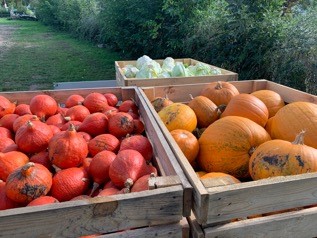

Transparent Communication and Community Participation
SpeiseGut maintains transparent communication with its members through newsletters, keeping them informed about the farm's situation and progress. This practice not only keeps the community engaged but also fosters a sense of belonging and participation among the members.
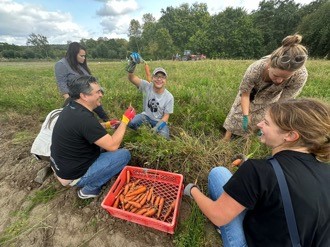
Altering Perspectives on Food Consumption and Sustainability
Participating in community farming fundamentally alters one’s perspective on food consumption and sustainability by providing a firsthand experience of the farming process. It demystifies the journey from seed to plate, highlighting the labor, challenges, and expertise required to cultivate crops. This direct involvement fosters a deeper appreciation for the produce, likely influencing more mindful consumption and waste reduction. Moreover, understanding the impact of sustainable practices on the environment and crop yield may propel participants towards advocating for and adopting more sustainable lifestyles.
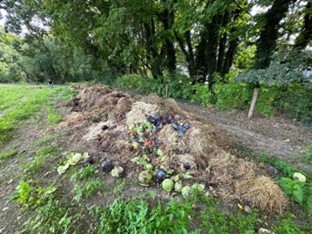
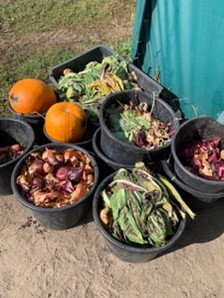
Promoting Sustainable Farming and Community Building
SpeiseGut not only promotes sustainable farming but also fortifies community building among urban dwellers. It provides a common ground where individuals, bound by a shared interest in organic farming and sustainability, can connect, share experiences, and learn from each other. This includes sharing of recipes on how to cook delicious food from the seasonal vegetables and learn about the variety of recipes available to prepare. The communal aspect of sharing both the joys and challenges of farming, celebrating harvests, fosters a sense of belonging and collective responsibility among the participants.



Sustainable and Organic Farming Practices
The farm is committed to organic and sustainable methods, utilizing innovative pest management techniques, such as using seed oils and planting herbs that act as bio-pesticides. Additionally, netting is used as a physical barrier to protect the crops without resorting to chemical interventions. The land has been used for agricultural practices over the last decades. Before the CSA started, the area was used by a conventional horticulture business. Speisegut utilizes cow and horse manure, not just as a fertilizer, but as a means to create beneficial soil structure. Basic fertilization with potassium and lime also plays a crucial role in maintaining the fertility and health of the soil.






Employing a strategy of direct marketing to regional markets, which includes retail outlets, hospitals, kindergardens and schools Gatower Gemüsegarten diversifies market risks. This approach not only ensures a stable market for their produce but also allows them to contribute to the local economy and provide fresh, organic produce to a wider community.
Adapting the Model Globally
The model of SpeiseGut can be adapted or expanded to other urban settings globally by:
- Identifying Suitable Locations: Seek urban spaces, such as vacant lots or community parks, that can be converted into farming plots.
- Community Involvement: Engage local communities to understand their interest and involve them in the planning and execution phases.
- Collaboration: Partner with local authorities, NGOs, and businesses for support in terms of resources, expertise, and funding.
- Education: Implement workshops and training sessions on sustainable farming practices to equip participants with the necessary knowledge and skills.
- Technology Integration: Leverage technology for efficient water and resource management, and to create platforms for knowledge sharing among global community farming initiatives.
Community farming, as witnessed in Berlin-Gatow and exemplified by SpeiseGut, stands out as a beacon of sustainability, community participation, and environmental stewardship. It not only provides a source of fresh, organic produce but also serves as a platform for education, community building, and promoting sustainable living among urban dwellers. As our cities continue to grow, models like these sow the seeds for a future where consumers and farmers can coexist in a mutually beneficial ecosystem, fostering a global movement towards sustainability and mindful consumption.